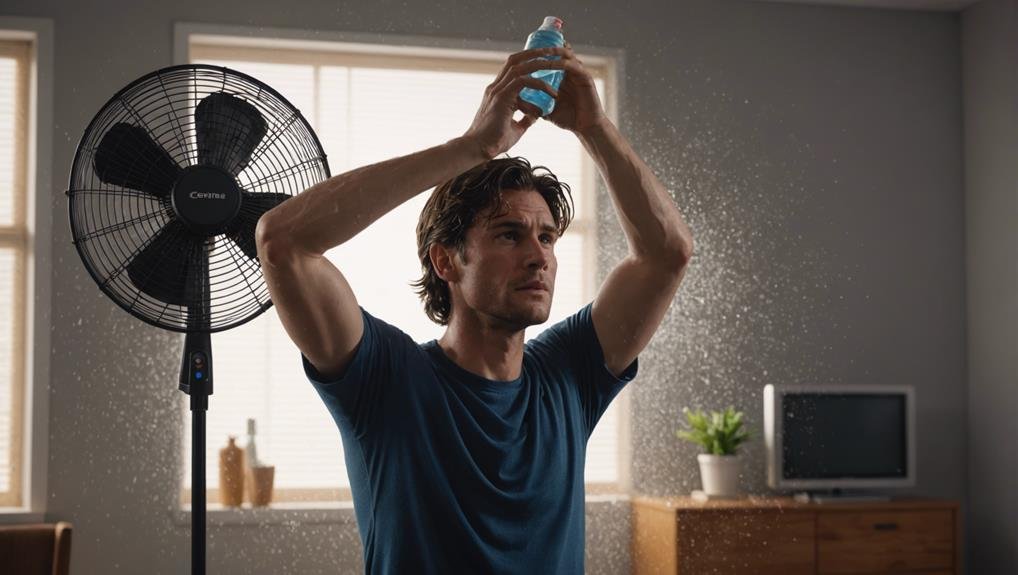Sweat Solutions: Combatting Excessive Perspiration
Combat excessive perspiration by exploring tailored treatments, lifestyle adjustments, and advanced medical procedures addressing hyperhidrosis. Consider options like antiperspirants, lifestyle changes, and alternative therapies for effective sweat control. Consult healthcare professionals to find a suitable treatment plan. Additionally, Botox injections and oral medications offer temporary relief. For severe cases, surgical interventions such as nerve ablation provide significant quality of life improvements. Embrace a multifaceted approach to combat excessive perspiration, targeting the underlying causes for long-term management.
Key Takeaways
- Tailored treatment options for specific body areas based on hyperhidrosis severity.
- Lifestyle modifications like loose clothing and stress management to reduce sweating.
- Dietary adjustments such as avoiding spicy foods and caffeine to minimize perspiration.
- Alternative therapies and natural remedies can complement traditional treatments.
- Consult healthcare professionals for personalized advice on managing excessive sweating.
Understanding Hyperhidrosis Treatment Options
When exploring treatment options for hyperhidrosis, you must consider various effective approaches tailored to address excessive sweating in specific areas of the body. Alternative therapies like acupuncture and herbal remedies may offer relief.
Lifestyle changes such as wearing breathable fabrics and avoiding spicy foods can help manage symptoms. Understanding the role of sweat glands and their sensitivity to acetylcholine is vital in selecting the right treatment.
Topical antiperspirants target sweat glands to reduce perspiration. Iontophoresis, involving a mild electric current, can block sweat gland activity. These methods aim to alleviate the overproduction of sweat by addressing the underlying cause of acetylcholine sensitivity.
Effective Solutions for Excessive Sweating
For individuals seeking effective solutions to combat excessive sweating, a range of treatment options tailored to address specific areas of the body are available. Lifestyle modifications, such as wearing loose clothing, using breathable fabrics, and managing stress levels, can help reduce excessive sweating.
Dietary considerations like avoiding spicy foods and caffeine may also play a role in managing sweat production. Alternative therapies and natural remedies like acupuncture, herbal supplements, and biofeedback techniques have shown promise in some cases. These approaches can complement traditional treatments and provide additional relief for those dealing with hyperhidrosis.
It's essential to consult with a healthcare professional to explore the most suitable options based on individual needs and preferences.
Managing Hyperhidrosis With Antiperspirants
When managing hyperhidrosis with antiperspirants, it's crucial to recognize that these topical products containing aluminum salts can effectively reduce excessive sweating in targeted areas of the body.
Antiperspirants with aluminum salts are specifically formulated for underarm, hand, and foot sweating. When applied once or twice a week, these antiperspirants can help regulate sweat production in these troublesome areas.
However, bear in mind that antiperspirants may cause dryness or skin irritation as potential side effects. For individuals seeking topical solutions for hyperhidrosis, antiperspirants offer a convenient and accessible option to manage excessive sweating.
Remember to consult with a healthcare professional to determine the most suitable treatment plan based on your specific needs and concerns.
Botox Injections and Oral Medications for Sweat Control
To effectively control excessive sweating, consider the benefits of Botox injections and oral medications as viable treatment options. Botox injections, FDA-approved for underarm hyperhidrosis, can provide relief for 6–10 months by paralyzing nerves that release acetylcholine. However, risks include bleeding and muscle weakness at the injection site. Multiple injections, typically 12–14 per armpit, are required for best results.
Oral anticholinergic medications are another option to reduce sweat gland activity, but they may come with side effects. While Botox offers temporary relief, medication side effects should be carefully considered before proceeding. It's advisable to consult with a healthcare professional to discuss the most suitable treatment plan based on individual needs and preferences.
Surgical Interventions for Severe Hyperhidrosis
Considering the limitations and potential risks associated with non-surgical treatments like Botox injections and oral medications for hyperhidrosis, individuals with severe cases may explore surgical interventions as a more permanent solution. Surgical advancements have led to minimally invasive procedures such as nerve ablation, offering long-term relief for excessive sweating.
Nerve ablation involves destroying specific nerves that contribute to hyperhidrosis, disrupting the signals that trigger excessive sweating. This procedure is often performed using advanced technology to precisely target the affected nerves while minimizing damage to surrounding tissues. While surgical interventions like nerve ablation carry risks like any surgery, they can provide significant improvement in quality of life for individuals with severe hyperhidrosis who haven't found relief through other treatments.
Conclusion
Ready to say goodbye to the struggles of excessive sweating?
From antiperspirants to Botox injections, there are numerous effective solutions to combat hyperhidrosis.
Whether you opt for medical interventions or lifestyle changes, taking control of your perspiration is within reach.
Don't let hyperhidrosis hold you back any longer – explore the options available and find the right solution that works for you.
Say hello to a sweat-free life and embrace confidence!







